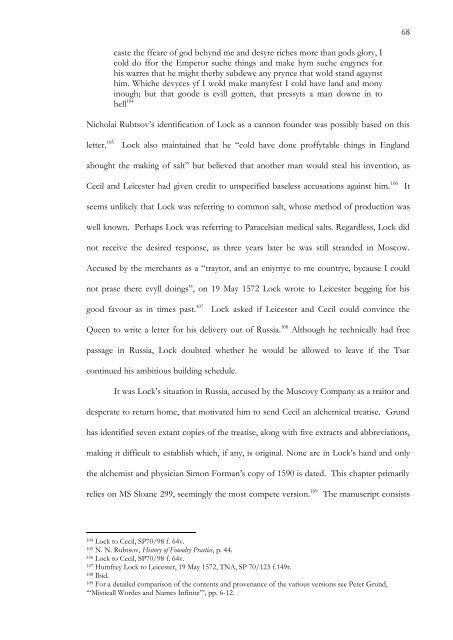The Alchemical Patronage of Sir William Cecil, Lord Burghley
The Alchemical Patronage of Sir William Cecil, Lord Burghley
The Alchemical Patronage of Sir William Cecil, Lord Burghley
You also want an ePaper? Increase the reach of your titles
YUMPU automatically turns print PDFs into web optimized ePapers that Google loves.
caste the ffeare <strong>of</strong> god behynd me and desyre riches more than gods glory, I<br />
cold do ffor the Emperor suche things and make hym suche engynes for<br />
his warres that he might therby subdewe any prynce that wold stand agaynst<br />
him. Whiche devyces yf I wold make manyfest I cold have land and mony<br />
inough; but that goode is evill gotten, that pressyts a man downe in to<br />
hell 104<br />
Nicholai Rubtsov‘s identification <strong>of</strong> Lock as a cannon founder was possibly based on this<br />
letter. 105 Lock also maintained that he ―cold have done pr<strong>of</strong>fytable things in England<br />
abought the making <strong>of</strong> salt‖ but believed that another man would steal his invention, as<br />
<strong>Cecil</strong> and Leicester had given credit to unspecified baseless accusations against him. 106 It<br />
seems unlikely that Lock was referring to common salt, whose method <strong>of</strong> production was<br />
well known. Perhaps Lock was referring to Paracelsian medical salts. Regardless, Lock did<br />
not receive the desired response, as three years later he was still stranded in Moscow.<br />
Accused by the merchants as a ―traytor, and an eniymye to me countrye, bycause I could<br />
not prase there evyll doings‖, on 19 May 1572 Lock wrote to Leicester begging for his<br />
good favour as in times past. 107 Lock asked if Leicester and <strong>Cecil</strong> could convince the<br />
Queen to write a letter for his delivery out <strong>of</strong> Russia. 108 Although he technically had free<br />
passage in Russia, Lock doubted whether he would be allowed to leave if the Tsar<br />
continued his ambitious building schedule.<br />
It was Lock‘s situation in Russia, accused by the Muscovy Company as a traitor and<br />
desperate to return home, that motivated him to send <strong>Cecil</strong> an alchemical treatise. Grund<br />
has identified seven extant copies <strong>of</strong> the treatise, along with five extracts and abbreviations,<br />
making it difficult to establish which, if any, is original. None are in Lock‘s hand and only<br />
the alchemist and physician Simon Forman‘s copy <strong>of</strong> 1590 is dated. This chapter primarily<br />
relies on MS Sloane 299, seemingly the most compete version. 109 <strong>The</strong> manuscript consists<br />
104 Lock to <strong>Cecil</strong>, SP70/98 f. 64v.<br />
105 N. N. Rubtsov, History <strong>of</strong> Foundry Practice, p. 44.<br />
106 Lock to <strong>Cecil</strong>, SP70/98 f. 64v.<br />
107 Humfrey Lock to Leicester, 19 May 1572, TNA, SP 70/123 f.149r.<br />
108 Ibid.<br />
109 For a detailed comparison <strong>of</strong> the contents and provenance <strong>of</strong> the various versions see Peter Grund,<br />
‗―Misticall Wordes and Names Infinite‖‘, pp. 6-12.<br />
68















